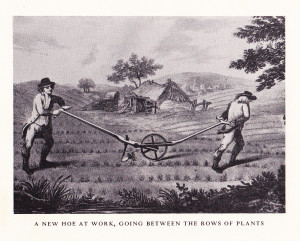
One of the major reasons the Regency era continues to fascinate me is the increasing importance of the city as industrialization begins to change the face of the global economy. Naturally, mechanization of all kinds of tasks had a huge impact on the agricultural landscape as well. I found this interesting snippet in a 1828 Encyclopedia showing some of the rapidly inflating costs of farming between 1790 and 1813:
Note the doubling of costs in rent, labor, and team while manure costs seemed to swing wildly, reaching a peak in 1803.
Taxation, overabundance of crops, and less of gentried subsidies/more dependence on income are cited as reasons for the ensuing agricultural depressions of the 1810s (Agricultural Depression and Farm Relief in England 1813-1852, By Leonard P. Adams). No doubt, the increase in costs were part of a larger shifting economy which contributed to the decreasing importance of agriculture as industrialization took the forefront.











